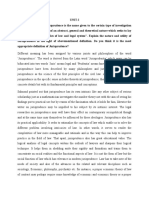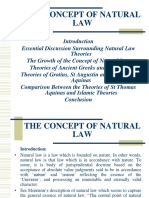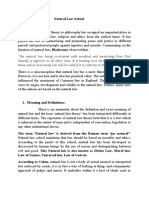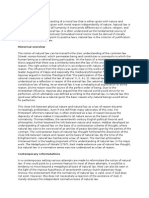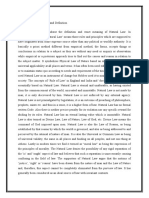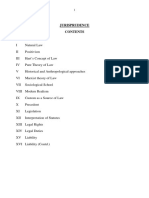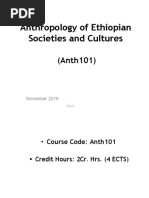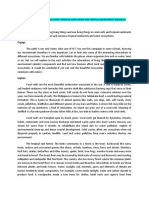NtrlLwTh;IPOL;LL.B1;IJT
NtrlLwTh;IPOL;LL.B1;IJT
Uploaded by
RAI SHAHZAIB MUMTAZCopyright:
Available Formats
NtrlLwTh;IPOL;LL.B1;IJT
NtrlLwTh;IPOL;LL.B1;IJT
Uploaded by
RAI SHAHZAIB MUMTAZCopyright
Available Formats
Share this document
Did you find this document useful?
Is this content inappropriate?
Copyright:
Available Formats
NtrlLwTh;IPOL;LL.B1;IJT
NtrlLwTh;IPOL;LL.B1;IJT
Uploaded by
RAI SHAHZAIB MUMTAZCopyright:
Available Formats
Syllabus Revision Program by Islami Jamiat Talba,
For Batch 19-24 and 20-25,
Punjab University Law College.
Subject: Introduction to Philosophy of Law (LL.B Part I)
Natural Law Theory
Introduction:
According to Lord Lloyd of Hampstead, natural law was wide spread in the field of ethics,
politics, law and religion infrom the earliest times. It has played a front-page role to promote
peace, conscience and justice in different ages against discord, tyranny and injustice. It may be
religious or supernatural but in modern times it has become political and legal theory(weapon).
Natural law has always been there in the world, from stone age to the current days. It has seen
days of decline and peak. And it has played a major part in the evolution of man himself. There
have always been many theories about it; some believed it to be deep in the conscience of man,
some believed it to be divine guidance provided by the divine being and many others. It has
many names, like; moral law, natural law, divine law, naturalism, etc.
The natural law theory is co-existent with mankind and originate from God himself, is superior
to all other laws. It is binding over all countries at all time and no man-made law will be valid if
it is contrary to the law of nature – Blackstone (“This law of nature, being co-eval with mankind
and dictated by God himself, is of course superior in obligation to any other.”)
MEANING OF NATURAL LAW
According to Merriam Webster Dictionary:
“A body of law or a specific principle held to be derived from nature and binding upon human
society in the absence of or in addition to positive law.”
DEFINATIONS OF NATURAL LAW
Natural law is a system of law based on human nature. It consists on this idea that rights, values
and responsibilities are inherent in human nature. Simply we can say that, “Natural law is a set of
principle of right and wrong, good and bad which are inherent in human nature not created by
any external force such as society, government and courts.”
Page1|7
Session 2021 - 2022
Thomas Aquinas wrote most extensively about natural law. He stated, “The light of reason is
placed by nature [and thus by God] in every man to guide him in his acts.”
MAIN FEATURE OF NATURAL LAW
1. No formal code (-no penalty for its violation)
2. Not made by man just discovered by man
3. Endless and unalterable
4. Natural law is not enforceable by external agency
5. Natural law has an eternal lasting value
6. Natural law is not promulgated by legislation
(Note: main features need to be the crux of the theory not this random.)
1. Emanates from an absolute source
2. Justice and morality are two pillars of natural law
3. Reason and common sense are the basis of natural law
4. Natural law is common to all states
5. Propositions of natural law are both self-evident and eternally valid
6. According to the naturalists, unjust law is no law.
EVOLUTION OF NATURAL LAW THEORY
The concept of natural law theory varies from time to time so the development, changing and
evolution has occurred at different stages. It is divided into four main time periods.
1. Ancient period
2. Mediaeval period
3. Renaissance period
4. Decline of natural law theory to 19th century positivism
5. Revival of Natural Law in 20th Century
Ancient Period
1. Heraclitus –Greek thinkers laid the basis of Natural Law and developed its essential
features. Heraclitus laid the basis of natural law he found it in the rhythm of events. The
concept of natural theory was given by Greek Philosopher who describe three main
characteristic features of law namely; destiny, reason and order. According to him reason is
one of the essential features of natural law.
2. Socrates –Socrates reflects upon the elements which was the decisive factor in the culture
of his time. He defined virtue, the fundamental ethical conception, as insight, in turn, as
knowledge of the good, the conception of good with no universal content. The Socrates
occupies an important place among the Greek Philosophers and he was a great admirer of
truth and natural values. He stated that like natural physical this is a natural moral law. He
Page2|7
Session 2021 - 2022
thought that justice is of two type natural justice and legal justice. The rule of natural
justice remains constant at every place but legal justice may differ from place to place.
3. Heraclitus - The concept of natural theory was given by Greek Philosopher who describe
three main characteristic features of law namely; destiny, reason and order. According to
him reason is one of the essential features of natural law.(Greek comes at the very first)
4. Plato –Plato laid the foundation for much subsequent speculation of Natural Laws themes.
He developed the idea of „justice‟ as an absolute „thing-in-itself‟ having the qualities of
truth and reality higher than the positive law, which could then be seen as a mere shadow
of justice. He considered that only worthy and intelligent people should be king. He said
every person should mind his own work without interfering with other work.
5. Aristotle - “Law is either universal or special. Special law consists of the written
enactments by which man are governed. The universal law consists of those unwritten rules
which are recognized among all men. Right and wrong have been defined by reference to
two kind of law…...Special law is that which is established by each people for
itself……The universal law is that which is conformable merely to Nature.”(Rhet.i)
6. Stoics – To Stoics, the postulates of reason are universal force. They binding on all men
everywhere. Men are endowed with reason, irrespective of nationality and race.
7. Rome –The theory of Stoics exercised great influence upon Roman jurists and some of
them paid great tribute to natural law. In roman system theory of natural law did not only
remain confined in theoretical discussions only. The Romans used natural law to transform
their rigid system into a cosmopolitan one. The Romans had three divisions of law:
Jus civile (civil law)
Jus gentium (international law)
Jus naturale (natural law)
8. Cicero – “There is indeed a true law, right reason, agreement with nature, diffused among
all men, unchanging, everlasting…… It is not allowable to this law, nor to derogate from it,
nor can it be repealed. We cannot be released from this law, either by the praetor or by the
people, nor is every person required to explain or interpret it. Nor is it one law at Rome and
another at Ethen, one law today and another hereafter; nut the same law, everlasting and
unchangeable, will bind all nations at all times; and there will be one common Lord and
ruler of all, even God the framer and proposer of this law.” (De Rep. iii)
Mediaeval Period
This record started from 12 to 14th century generally in the European history. According to
them all the laws are either divine or human, the base of divine law is nature and human law is
custom.
Saint ThomasAquinas – Considered representative of natural law theory in the mediaeval
period. He thought social organization and state are natural phenomena. Men activities are
directed to survival and perfection. He must do this at any price and do anything against these
ends share be immoral or wrong.
Thomas gave four classification of law:
Page3|7
Session 2021 - 2022
I. Divine law or law of scripture/ Eternal law
II. Law of God/ Divine law
III. Natural law
IV. Human law or positive law
i. Eternal Law: which constitutes God‟s rational guidance of all created things,
is derived from the divine wisdom and based on a divine plan.
ii. Divine law: It is part of eternal law which is manifested through revelations of
the holy scriptures.
iii. Natural law: it describes the participation of rational creatures in the eternal
law through the operation of reason.
iv. Human law: it is derived from both divine and natural law, which is ormust be
directed towards the attainment of common good. This law may variable in
accordance with the time and circumstances in which it is formulated, but its
essence is to be just.
All in all, through these operations of reason, a just law is derived, which is considered as the
essence of natural law. According to Aquinas: “lex injusta non est lex” (Latin) “Unjust law is no
law”. As well according to Aquinas; the biggest evil is the instability in society.
Period of Renaissance
Renaissance period also called Hugo Grotius.
Hugo Grotius – He was a great philosopher, jurist and thinker in his age. He gave the theory
of functional natural law in his laws of war and peace. He said natural law is not based on just
reason but on right reason.
He is also called the father of international law. He considered divine law as the grandmother,
natural law as parents, and positive law as the child.
Pufendorf –Like Grotius, Pufendorf based natural law on the two sides of human nature which
bids him to protect his personal property but not to disturb the peace of society.
Hobbes –Thomas Hobbes (1588-1679) was the author of two books, De Cive and The
Leviathan. He lived during the days of civil war in England and hence was convinced of the
great importance of State like authority which he wanted to be vested in an absolute ruler.
Hobbes understood the authority of natural law but he understood it in a sense different from
those writers for whom natural was superior to positive law. It was the starting of the era of
Social Contract Theory and it remained dominant throughout the 18thCentury.
DECLINE OF NATURAL LAW THEORY
The Social Contract Theorydid not survive the 18th century. One reason was that an
individualistic conception of society put forward by rationalism of the 18 th century gave way to a
collective conception stimulated by the rising tide of nationalism. Another reason was the
stupendous growth of natural science gave strength and emphasis to empirical method against
deductive method. In the 19th century the natural law theories reflected due to the great economic
Page4|7
Session 2021 - 2022
and political changes in Europe. The problems created by new changes and development
demanded political and concrete solutions. Individualism gave way to collectivistic outlook,
political theories and modern sciences started saying that there are no absolute and unchangeable
principles. Before this David Hume also destroyed the theoretical basis of natural law. The
natural theory was base on reason and Hume showed that reason as understood was based on
confusion.
Bentham –Bentham regarded natural law as nothing but a phrase. He mercilessly criticized the
idea of natural rights and described them as “simple nonsense; natural and imprescriptible rights,
rhetorical nonsense, nonsense upon slits”. About the principal of equality, he wrote: “Absolute
equality is absolutely impossible. Absolute liberty is directly repugnant in the existence of every
kind of government…
Austin –John Austin rejected natural law on the ground that it was ambiguous and misleading.
According to him, the science of jurisprudence is concerned with positive law by which he meant a
science of laws. Austin was opposed to the concept of natural rights of individuals against the
State.
REVIVAL OF NATURAL LAW THEORY
At the end of 19th century there was a revival of natural law theories. It was due to following
reason:
I. It was realized that abstract thinking was not completely futile.
II. Positive theories failed to solve the problems created by new changes and modern
sciences.
III. It emerged as a reaction against the legal theories which has exaggerated the importance
of positive law.
IV. The ideologies of fascism also led to the revival of natural law theories, as that time
during the two world wars the world witnessed the great destruction of human lives and
property and principles of natural law were approaches in order to attain peace.
V. There was a search of ideal justice the result was the revival of natural theory.
VI. Science began to become doubtful about itself and scientific facts.
VII. The material progress and its effect made the thinkers look for some standards.
MODERN NATURAL LAW THEORISTS
George J.F Kohler
He was impressed from Hegel. He said: “The standard of conduct which in consequence of
the inner impulse that urges upon men towards a reasonable form of life, emanates from the
whole, and is forced upon the individual”. He says that there is no eternal law and the law
shapes itself as the society advances morality and culturally in course of evolution.(Albert
Kocourek)
Page5|7
Session 2021 - 2022
Lon Luvois Fuller
He rejected Christian doctrines, 17th and 18th century rationalist doctrines of natural rights.
His principal affinity was with Aristotle. He found a „family resemblance‟ with various
Natural law theories, the search for principles of social order. According to him the process
of moral discovery is a social one and that there is something akin to a celebrative
articulation of shared purposes-, by which men come to understand better their own ends
and discern- more clearly the means for achieving them.
John Mitchell Finnis
He asserts the values of his self-evident basic goods are the impossible to measure. Basic
problems are created when morality is divorced from values. According to him the natural
law is the set of principles of practical reasonableness in ordinary human life and human
community. [Natural law and natural rights by Finnis]
CONTRIBUTIONS OF NATURAL LAW THEORY
1. Based upon morality
2. Revolutions and freedom struggles have been based upon natural law precepts
3. Important legal principles are based upon natural law concepts
4. Basis for fundamental rights
5. Checks and bad regimes
6. Justification to resist bad laws
7. Limits the power of legislature
CRITICISM ON NATURAL LAW THEORY
1. Critics of Natural Law Theory say that it is doubtful, however, that the inherent
nature of Homo-Sapiens establishes law of behavior for human beings in the same
way as it may establish laws of behavior for cats, lions and polar bears. It is difficult
because so much of human behavior is shaped by the environment, that is, by
deliberate and non-deliberate conditioning, training and education.
2. It is doubtful that one can infer moral principles forbidding adultery, rape,
homosexuality, and so forth, either from biological facts about human nature or
from facts about the inherent nature of Homo-Sapiens.
3. Two philosopher Aristotle and Aquinas integral to the theory have different views
about God‟s role in nature, which confuses the issue, especially when trying to
decipher if the theory relies on the existence of God. [Ethics by Stephen O
Sullivan Philip A]
Page6|7
Session 2021 - 2022
CONCLUSION
We can say that Natural Law Theory means are those rules and principles which are
supposed to have a supreme origin other than any political or worldly authority. Some
philosophers say that these rules have divine origin. Some find source in nature some hold
that is the product of reason. Modern sociological jurists and realists have supported the
natural law theory to support their theories and ideology to reconcile the contrary interests
of individuals in the society. The concept of natural law theory has been changing from
time to time.
References:
Jurisprudence by V.D Mahajan
Introduction to philosophy of law by M.A Chaudhary
Jurisprudence by Salmond
Research Article by Natural Law School
Prepared by: Muhammad Usman Elif Section P ---(2020-25)
Team Head: Abdul Rehman
Project Head: Maher IbtisamElahi.
BEST OF LUCK … !!
Page7|7
Session 2021 - 2022
You might also like
- Political Science-I (LISALS) - 1Document114 pagesPolitical Science-I (LISALS) - 1RAI SHAHZAIB MUMTAZ67% (3)
- D1.02 Project Management SMSDocument34 pagesD1.02 Project Management SMSNews & Views50% (2)
- 1.6 Practice KeyDocument4 pages1.6 Practice Keyplight-04.pancakeNo ratings yet
- Natural LawDocument12 pagesNatural LawLAW MANTRA100% (3)
- Schools of Thought - Natural LawDocument2 pagesSchools of Thought - Natural LawAnkit Bhatt100% (1)
- Jurisprudence ExamDocument16 pagesJurisprudence ExamSinghNo ratings yet
- Natural Law Influence IndiaDocument11 pagesNatural Law Influence IndiamurkyNo ratings yet
- The Concept of Natural Law 1 - JurisprudenceDocument37 pagesThe Concept of Natural Law 1 - JurisprudenceGunasundaryChandramohan100% (1)
- 3. Module 2- Natural Law SchoolDocument40 pages3. Module 2- Natural Law Schoolparinluj29No ratings yet
- Natural LawDocument14 pagesNatural LawVinay Kr Kumar100% (1)
- Natural Law TheoryDocument17 pagesNatural Law Theorysamir anand100% (1)
- Jurisprudence II Combined Notes For 5 TopicsDocument33 pagesJurisprudence II Combined Notes For 5 TopicsasekenyelornahNo ratings yet
- NATURAL LAW SCHOOL CLASSICAL AND MODERNDocument13 pagesNATURAL LAW SCHOOL CLASSICAL AND MODERNNEELAM THOKENo ratings yet
- Unit-II Notes- Natural Law School of JurisprudenceDocument11 pagesUnit-II Notes- Natural Law School of Jurisprudencemohdarif.lawNo ratings yet
- Natural Theory of LawDocument9 pagesNatural Theory of Lawsadafayoub999No ratings yet
- Natural Law PhilosophyDocument49 pagesNatural Law Philosophymurky100% (1)
- Introduction To Traditional and Modern Natural Law TheoriesDocument9 pagesIntroduction To Traditional and Modern Natural Law TheoriessarnatNo ratings yet
- Natural Law Theory JurisprudenceDocument3 pagesNatural Law Theory JurisprudenceDevesh SawantNo ratings yet
- 5. Natural Law theoryDocument16 pages5. Natural Law theoryAmmara ZaheerNo ratings yet
- Natural SchoolDocument10 pagesNatural SchoolSuhani ChughNo ratings yet
- Natural Law School-JurisprudenceDocument9 pagesNatural Law School-JurisprudencepriyaNo ratings yet
- Natural Law TheoriesDocument17 pagesNatural Law TheoriesAnusha100% (1)
- Natural Law TheoryDocument68 pagesNatural Law TheorygoldsilvermeadowNo ratings yet
- Intoduction To Philosophy of LawDocument10 pagesIntoduction To Philosophy of LawSadaf AhmadNo ratings yet
- Natural LWDocument9 pagesNatural LWBazeera FarhanaNo ratings yet
- jurisprudence notesDocument43 pagesjurisprudence notesaryaprasad2710No ratings yet
- JURISDocument92 pagesJURISRishi JhaNo ratings yet
- Natural LawDocument3 pagesNatural Lawvishwajeettripathi74No ratings yet
- MY PERSONAL JURISPRUDENCE I NOTES 2docxDocument34 pagesMY PERSONAL JURISPRUDENCE I NOTES 2docxDaniel ComboniNo ratings yet
- CH 5 (Natural Law Theory) FiDocument6 pagesCH 5 (Natural Law Theory) FiXain RanaNo ratings yet
- Concept of Natural LawDocument7 pagesConcept of Natural LawNavin NavinNo ratings yet
- Schools of Jurisprudence.Document24 pagesSchools of Jurisprudence.Gukiina Patrick100% (1)
- Natural Law SchoolDocument7 pagesNatural Law Schoolalishaneeru2102No ratings yet
- Jil 521 - Jurisprudence-2Document63 pagesJil 521 - Jurisprudence-2gratoerunsNo ratings yet
- Natural Law School: Dr. D. Ganesh Kumar Assistant ProfessorDocument17 pagesNatural Law School: Dr. D. Ganesh Kumar Assistant ProfessorShubangi GNo ratings yet
- Historical OverviewDocument22 pagesHistorical OverviewPrabhash ChandNo ratings yet
- Jurisprudence: Submitted By-Amit Grover Bba LLB (H) Section B Semester 7 A3221515130Document10 pagesJurisprudence: Submitted By-Amit Grover Bba LLB (H) Section B Semester 7 A3221515130Amit GroverNo ratings yet
- Natural Law School of JurisprudenceDocument6 pagesNatural Law School of JurisprudenceHusain BohraNo ratings yet
- JurisDocument11 pagesJurisUjjwal AnandNo ratings yet
- Natural School of LawDocument11 pagesNatural School of LawTanisha TarunNo ratings yet
- Natural LawDocument8 pagesNatural LawBazeera FarhanaNo ratings yet
- Priya A Jagadish Course Teacher: Jurisprudence JSS Law College, Autonomous MysuruDocument24 pagesPriya A Jagadish Course Teacher: Jurisprudence JSS Law College, Autonomous MysuruVENKAT SNo ratings yet
- JurisprudenceDocument50 pagesJurisprudenceIzuora EdNo ratings yet
- History of Natural Law School, Decline and RevivalDocument5 pagesHistory of Natural Law School, Decline and Revivalsanaparveen96500No ratings yet
- JurisssDocument37 pagesJurissslakshya agarwalNo ratings yet
- Natural LawDocument22 pagesNatural LawY.Robert IASNo ratings yet
- An Overview of The Natural School of Law - IpleadersDocument17 pagesAn Overview of The Natural School of Law - Ipleadersrupaldash6No ratings yet
- D. FLORES - The Natural Moral Law and The Canon Law PDFDocument70 pagesD. FLORES - The Natural Moral Law and The Canon Law PDFGeorges GrigoNo ratings yet
- Formulations of The Concept of Natural LawDocument9 pagesFormulations of The Concept of Natural LawJemimah VillarinNo ratings yet
- JurisprudenceTheories PDFDocument198 pagesJurisprudenceTheories PDFThakur Shreyash SinghNo ratings yet
- D1237TCL Jurisprudence PDFDocument198 pagesD1237TCL Jurisprudence PDFklllllllaNo ratings yet
- Rosales, Twinkle Anne G. Che-1303 Ged 107 EthicsDocument20 pagesRosales, Twinkle Anne G. Che-1303 Ged 107 EthicsTwinkleAnneGonzalesRosalesNo ratings yet
- JurisprudenceDocument16 pagesJurisprudenceRajeev RajNo ratings yet
- Natural Law Theory: Ancient TheoriesDocument10 pagesNatural Law Theory: Ancient TheoriesnidhitoreachNo ratings yet
- Natural LawDocument14 pagesNatural LawHarshini PrakashNo ratings yet
- Natural Law and Philosophical SchoolDocument15 pagesNatural Law and Philosophical SchoolKomal100% (1)
- Juris ProjectDocument12 pagesJuris ProjectAbhinavParashar0% (1)
- Topic 1Document101 pagesTopic 1Adrian Roxas0% (1)
- As Embarrassing To The Jurist As The Well-Know Question What Is Truth?' Is To The LogicianDocument1 pageAs Embarrassing To The Jurist As The Well-Know Question What Is Truth?' Is To The LogicianClarisa Anne AgapitoNo ratings yet
- Date Sheet For The Associate Degree in ArtsScience Part I Supplementar49916Document1 pageDate Sheet For The Associate Degree in ArtsScience Part I Supplementar49916RAI SHAHZAIB MUMTAZNo ratings yet
- Todays solved PPSC test 1Document7 pagesTodays solved PPSC test 1RAI SHAHZAIB MUMTAZNo ratings yet
- PPSC Pakistan studies From Battles to Sikh EmpireDocument6 pagesPPSC Pakistan studies From Battles to Sikh EmpireRAI SHAHZAIB MUMTAZNo ratings yet
- Interpretation NotesDocument40 pagesInterpretation NotesRAI SHAHZAIB MUMTAZNo ratings yet
- GK Lecture 12Document2 pagesGK Lecture 12RAI SHAHZAIB MUMTAZNo ratings yet
- Criminology NotesDocument45 pagesCriminology NotesRAI SHAHZAIB MUMTAZNo ratings yet
- PPSC Assistant S&GAD Past Papers MCQs - 2012 (Test Data 1)Document101 pagesPPSC Assistant S&GAD Past Papers MCQs - 2012 (Test Data 1)RAI SHAHZAIB MUMTAZNo ratings yet
- LegislationDocument8 pagesLegislationRAI SHAHZAIB MUMTAZ100% (1)
- Date Sheet For The Associate Degree in ArtsScience Part II Supplementa1273Document1 pageDate Sheet For The Associate Degree in ArtsScience Part II Supplementa1273RAI SHAHZAIB MUMTAZNo ratings yet
- Pakistan-E 3Document7 pagesPakistan-E 3RAI SHAHZAIB MUMTAZNo ratings yet
- PrecedentDocument11 pagesPrecedentRAI SHAHZAIB MUMTAZ100% (1)
- Pakistan Study Part-1Document28 pagesPakistan Study Part-1RAI SHAHZAIB MUMTAZNo ratings yet
- Chapter Wise General Sci 9Document6 pagesChapter Wise General Sci 9RAI SHAHZAIB MUMTAZNo ratings yet
- 600+ MCQs - LAW GAT PAST PAPERS-1Document68 pages600+ MCQs - LAW GAT PAST PAPERS-1RAI SHAHZAIB MUMTAZNo ratings yet
- Social Work Part 1 Punjab University Past PapersDocument12 pagesSocial Work Part 1 Punjab University Past PapersRAI SHAHZAIB MUMTAZNo ratings yet
- Pakistan Study Part-3Document41 pagesPakistan Study Part-3RAI SHAHZAIB MUMTAZNo ratings yet
- Chapter Wise Math Sci 9Document11 pagesChapter Wise Math Sci 9RAI SHAHZAIB MUMTAZNo ratings yet
- 6.remedies in TortDocument3 pages6.remedies in TortRAI SHAHZAIB MUMTAZ100% (1)
- PU 13 QUESTION ALL SUBJECT 2023 SocialogyDocument4 pagesPU 13 QUESTION ALL SUBJECT 2023 SocialogyRAI SHAHZAIB MUMTAZNo ratings yet
- Continents and Their Countries and CapitalsDocument12 pagesContinents and Their Countries and CapitalsRAI SHAHZAIB MUMTAZ100% (1)
- 2.acquisition of EasementDocument4 pages2.acquisition of EasementRAI SHAHZAIB MUMTAZNo ratings yet
- Sociology IIDocument161 pagesSociology IIRAI SHAHZAIB MUMTAZNo ratings yet
- Law of Tort and Easement 1Document50 pagesLaw of Tort and Easement 1RAI SHAHZAIB MUMTAZNo ratings yet
- LL.B Part-II Most Important Questions List Final 1Document2 pagesLL.B Part-II Most Important Questions List Final 1RAI SHAHZAIB MUMTAZ100% (1)
- Anthropology of Ethiopian Societies and Cultures: (Anth101)Document85 pagesAnthropology of Ethiopian Societies and Cultures: (Anth101)Mintesnot TilahunNo ratings yet
- New Look Central School, Bhilwara EXAM PATTERN 2019 - 2020 For Class Ix & XDocument5 pagesNew Look Central School, Bhilwara EXAM PATTERN 2019 - 2020 For Class Ix & Xvikas_2No ratings yet
- Powerpoint Lesson 92Document17 pagesPowerpoint Lesson 92Analen LagoNo ratings yet
- The Differences of Short Story, Novella, AndnovelDocument2 pagesThe Differences of Short Story, Novella, Andnovelsarush nahNo ratings yet
- Jee Apex Programme Micro ScheduleDocument66 pagesJee Apex Programme Micro Schedulesricharanreddy716No ratings yet
- The Examination of The Trait-Anger Level of The University Students According To The WellnessDocument7 pagesThe Examination of The Trait-Anger Level of The University Students According To The WellnessNiharika shuklaNo ratings yet
- CANON (MSDS) PRINTER TONER-FX-7-Black Expires 09-09-15 (OBSOLETE LAST REV OF MSDS)Document7 pagesCANON (MSDS) PRINTER TONER-FX-7-Black Expires 09-09-15 (OBSOLETE LAST REV OF MSDS)PubcrawlNo ratings yet
- The Ted TalkDocument4 pagesThe Ted TalkKris PaulNo ratings yet
- Step 2 - UnadDocument6 pagesStep 2 - UnadJane CamargoNo ratings yet
- Science, Technol Og y and Society: Claire B. SiongcoDocument22 pagesScience, Technol Og y and Society: Claire B. SiongcoClaireNo ratings yet
- ANSWERSDocument1 pageANSWERSeneaskNo ratings yet
- Instrument Report RepairedDocument3 pagesInstrument Report RepairedVadym LisovyiNo ratings yet
- Big Boy ColumbusDocument24 pagesBig Boy ColumbusAriel WilliamsNo ratings yet
- Mapua University: Experiment No. 3.B Hydrometer Analysis of SoilDocument9 pagesMapua University: Experiment No. 3.B Hydrometer Analysis of SoilMike SyNo ratings yet
- BPSC 111Document15 pagesBPSC 111Shubham PandeyNo ratings yet
- DLL - Mapeh 5 - Q1 - W1Document5 pagesDLL - Mapeh 5 - Q1 - W1mark genesis octavioNo ratings yet
- Inglés: Colegio Campestre Padre ArturoDocument14 pagesInglés: Colegio Campestre Padre ArturoLina MurciaNo ratings yet
- DNA Evidence in Contemporary Legal Perspective: Institutional ArticleDocument7 pagesDNA Evidence in Contemporary Legal Perspective: Institutional ArticleVijaykumar D SNo ratings yet
- FAT Procedure Rosemount 5302 (Visual Check Power On)Document15 pagesFAT Procedure Rosemount 5302 (Visual Check Power On)ganigunawanNo ratings yet
- Hitungan Diameter Pipa Pada Sistem Penyediaan Air Minum Sederhana (Pipe Diameter Calculation On Simple Drinking Water System)Document8 pagesHitungan Diameter Pipa Pada Sistem Penyediaan Air Minum Sederhana (Pipe Diameter Calculation On Simple Drinking Water System)Irvan ApriliandiNo ratings yet
- 02 Cost Behavior With Regression AnalysisDocument6 pages02 Cost Behavior With Regression Analysisrandomlungs121223No ratings yet
- ĐỀ THI THỬ HSG 11- N0 4Document9 pagesĐỀ THI THỬ HSG 11- N0 4Đức THNo ratings yet
- NOTESDocument9 pagesNOTESrockkyshakaibNo ratings yet
- Lesson 4Document2 pagesLesson 4Lhai MaeNo ratings yet
- Detailed LP in Teraching Science ThreeDocument14 pagesDetailed LP in Teraching Science ThreeJasmine Maneja PascualNo ratings yet
- PrüfergebnisDocument3 pagesPrüfergebnisnameNo ratings yet
- NCERT Solutions For Class 9 English Feb 13 Beehive Chapter 3 The Little GirlDocument6 pagesNCERT Solutions For Class 9 English Feb 13 Beehive Chapter 3 The Little GirlSai KaushalNo ratings yet
- 00 ISO 19443 Welcome Introduction Organisation - HandoutDocument17 pages00 ISO 19443 Welcome Introduction Organisation - HandoutRoberto Eduardo HilalNo ratings yet





